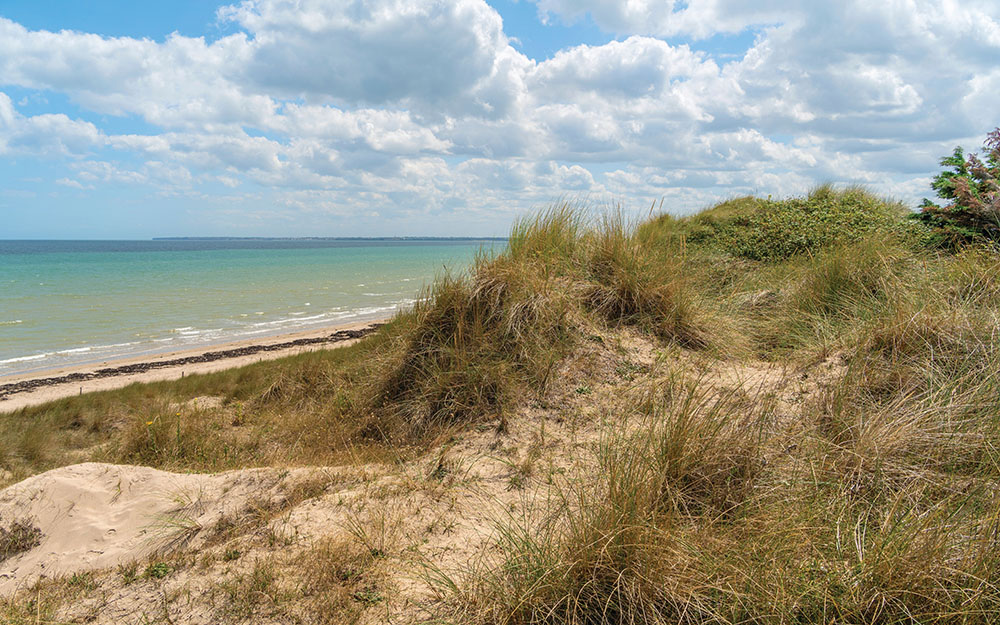Beachfront thoughts
I was lost. I knew I was in Normandy, France, but I was not sure exactly where. It was 1994, my first of many visits to Normandy. I had just arrived at the chateau of my barrister friend located in the three-house village of Ravenoville.

I decided to explore the neighborhood before lunch. I walked along an unpaved road through a landscape which would have been a marshland if the farmers had not cut numerous channels to drain it, creating islands of drier soil. I had no idea where I was heading but assumed I could find my way back to the chateau since there was only one road. I walked up a slight rise and was overwhelmed by the vista, the miles of open beach. It was not just any ocean beach; it was Utah Beach, the beach the U.S. 40th Infantry Division stormed on D-Day, June 6, 1944. It was part of the largest amphibious invasion in history. I could literally picture the thousands of GI’s jumping out of amphibious landing craft, struggling through the water and charging up the dunes while dozens of German MG 42 machine guns mowed them down. How could they do it? Why did they do it? Did they know it was for making a safer, indulgent life for us later generations of Americans? The debt I owed them brought tears to my eyes.
Nearby was a German concrete pillbox, or block house, used to protect the machine- gunners. I squeezed inside and looked out of the gun slits toward Utah Beach. New thoughts flooded my imagination. What did the German soldiers think when they saw thousands of enemy soldiers charging toward them? How could they face the onslaught of GIs intent on killing them? What were they fighting for? I concluded the answers to those questions were very much the same for the American GIs and the German soldiers. I walked back to the luxurious chateau I was visiting with a different perspective. I was born into a lucky generation, and we are standing on the shoulders of giants.
D-Day has been mythologized by us Americans, but what about the French? How do they view the plague of American bombs, artillery shells and bullets that devastated their land and villages? In a little cemetery adjoining a small chapel, I found a grave for a whole family of six who perished in the American bombing on June 5. Our army killed and maimed more French citizens during the invasion than they suffered during four years of German occupation. Shouldn’t they hate us?
The irony is that the people of Normandy in 1944 and the Normans today are very fond of Americans. American flags appear in shop windows. The Stars and Stripes are flown side-by-side on flag poles with the French tricolor in towns and villages. Surprising as it may seem, even today in 2024, Norman citizens express their gratitude to American tourists for their liberation. If you explain to a flower seller you are purchasing a bouquet to place on an American soldier’s grave you may hear, “Il n’y a pas de frais,’’ no charge. Should you test your limited French by asking, “pourquoi,” the response is often, “liberté,” freedom.
It is ironic the French attitude toward the British liberators may be best captured by a Gallic shrug of the shoulders, almost as if Britain did not land its army on Sword and Juno beaches on D-Day. This indifference bordering on animosity is due in part to an attitude held by some of my British friends that the French did not deserve liberation because they surrendered to the Nazis too fast and let Britain carry on the fight alone. It is a long time to hold a grudge, but the Brits do have a legitimate point. If having freedom is so essential to a nation, then one must be prepared for the long and hard fight to maintain it.
If having freedom is so essential to a nation, then one must be prepared for the long and hard fight to maintain it.
In 1994, on the 50th anniversary of D-Day, I naively thought Europe’s and, indirectly, our freedoms would never be in jeopardy from an invading totalitarian regime. Russia’s invasion of Ukraine has proven me wrong. Eighty years later we need to relearn the lessons of Normandy and D-Day. The Ukrainians are fighting and dying to protect our liberty. Are we prepared for the prolonged and grueling struggle to keep it, or will we abandon the Ukrainians to their fate? I know what those thousands of American soldiers buried in Normandy cemeteries and the people of Normandy would say.